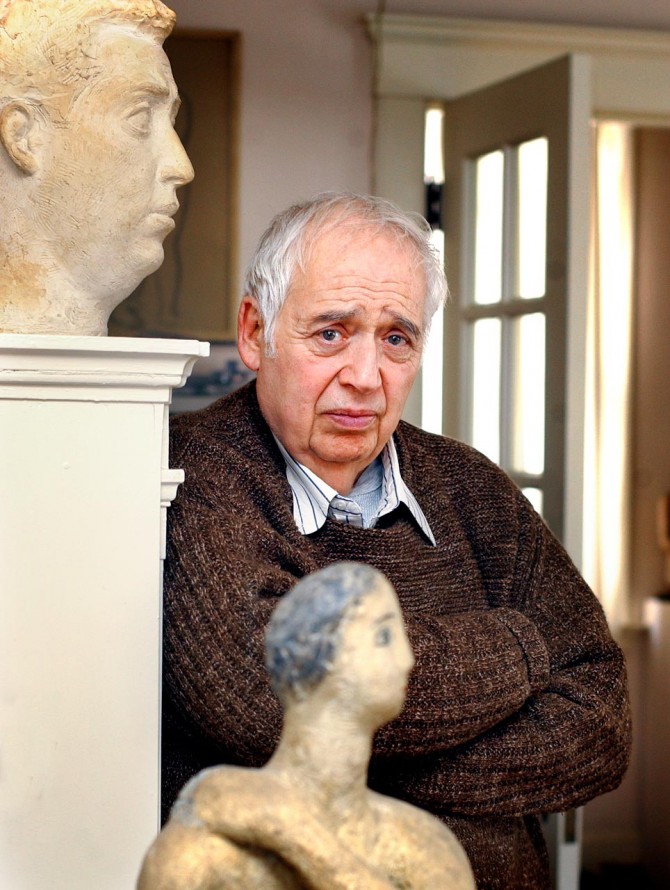Harold Bloom ’51, literary critic of influence, dies at 89
By Daniel Aloi
Harold Bloom ’51, a bestselling literary critic and a friend to many of Cornell’s English faculty over the years, died Oct. 14 in New Haven, Connecticut. A longtime professor of English at Yale University, Bloom was 89.
Bloom was born July 11, 1930, in the East Bronx. His parents were Eastern European immigrants, and Yiddish was his first language. Graduating from Bronx High School of Science, Bloom came to Cornell on a scholarship and majored in classics.
He was a student and advisee of the late M.H. Abrams in the Department of English.
Of Abrams’ influence, Bloom once said: “In the deep sense I owe my teaching and writing career to Mike. He fathered me during my difficult undergraduate years at Cornell. I was rough, shy, highly self-conscious and parenthetical. His care and knowledge gave me the control to harness my energy without crippling it.” Bloom provided a video testimonial for the Cornell celebration of Abrams’ 100th birthday in 2012.
In a 1999 interview, Abrams called Bloom “indisputably a genius and one of the great flamboyant characters of our era.”
Bloom went to Cambridge University on a Fulbright Scholarship in 1954-55, earned his Ph.D. from Yale in 1955, and joined its English faculty that year. He later became the Sterling Professor of the Humanities, the highest academic rank at Yale, and taught his last class from home on Oct. 10, four days before his death.
He also taught concurrently at New York University from 1988 to 2004.
In 1968, while he was a fellow at the Society for the Humanities, Bloom met the poet and Cornell professor A. R. Ammons, and the two became lifelong friends.
“Harold Bloom was my teacher [at Yale] and a personal hero,” professor of English Roger Gilbert said. “I reconnected with him through my work on Archie Ammons, who Bloom said was his best friend. I wrote an essay on Bloom and Ammons that described their relationship as a ‘bromance.’ Harold objected to my use of the term but otherwise loved the essay. … I really think there was an intensity in his connection with Archie Ammons that was possibly unique in his life.”
Gilbert described Bloom as very “affectionate toward me, and friends and students and colleagues. He was also very generous in his desire to help and to support the people he felt some kind of kinship to. He was larger than life, very mannered, very old-fashioned in his speech; he notoriously called everyone ‘my dear.’”
A prolific author, Bloom published more than 40 books – among them, 20 of literary criticism, several works on religion (including “The Book of J,” a bestseller) and a novel. The Library of America series is publishing an anthology of his writings this month.
His early books, starting with “Shelley’s Mythmaking” in 1959 (adapted from his doctoral dissertation), were critical studies of the Romantic poets, which examined the Romantic tradition and its influence on Ammons, Wallace Stevens and others.
Influence was a major theme he would return to often. His widely read works include “Shakespeare: The Invention of the Human” (1998), “How to Read and Why” (2000), and “The Anatomy of Influence: Literature as a Way of Life” (2011).
Some books were controversial. “The Anxiety of Influence: A Theory of Poetry” (1973) was published in more than 45 languages and still influences scholars; while “The Western Canon: The Books and School of the Ages” (1994) rejected the trend of multiculturalism in literary studies.
“He was not a fashionable figure. I know he got too polemical and dismissive of certain things,” Gilbert said, “but his passion for the poets and writers he loved redeemed his less appealing views. He wanted everyone to see the beauty and the wisdom of the writers he championed.”
Starting in the mid-1980s Bloom edited hundreds of volumes for Chelsea House Publishers, including a series of literary biographies and guides to individual books and authors, literary places and characters.
Bloom occasionally lectured at Cornell over the years. He also accepted an invitation to present the Baccalaureate Service address to graduates in 1999.
“After that we went to Archie’s house in Cayuga Heights and Abrams was there,” Gilbert said. “That may be the last time the three of them saw each other.”
Survivors include Jeanne, his wife of 61 years, and two sons.
Media Contact
Get Cornell news delivered right to your inbox.
Subscribe

